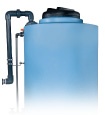Environmental stress cracking occurs in plastic tanks over time, under certain conditions. It’s a failure of the polymer material due to surface-initiated micro cracks or fractures. These micro cracks are caused by the combination of stresses and environmental effects.
Topics:
Value Added,
Tank Design and Materials,
FAQs
If the very first question your chemical tank supplier asks isn’t, “So, tell me, what kind of chemical are you storing in this tank?” they’re doing it wrong. The number one job for your tank supplier is to make sure you get the right chemical storage system for the chemical you’re using. If they don’t get that detail right, it can lead to serious risks and cost you thousands of dollars in additional costs.
Topics:
Value Added
This is the first article in Poly Processing’s Innovative Solutions Series, where you’ll discover the many innovations that we have introduced to the chemical storage industry. Not all high-density polyethylene tanks are created equal. Although they sound nearly identical, high density polyethylene (HDPE) and cross-linked polyethylene (XLPE) chemical storage tanks have significant differences. Those differences could impact your organization’s bottom line, your people’s safety, and the operations of your facility.
Topics:
Value Added,
FAQs
Without the right equipment, it’s difficult to judge how much volume of chemical you have in your chemical storage tanks. If you overestimate your volume, you could run out of inventory before the next delivery. The last thing you want to deal with is downtime that could have been avoided.
Topics:
Value Added
Purchasing a high-performance chemical storage tank is a significant investment for your company, and choosing the right tank for your needs isn’t always an easy decision. If you’re deciding between a fiberglass reinforced plastic (FRP) tank and crosslinked polyethylene (XLPE) tank, be sure you understand the differences between them and know what to expect in terms of cost, maintenance, service, delivery times, and protection. FRP tanks are coated with an interior chemical resin. Their structural layer is composed of chopped glass fiber or filament-wound fibers and resin. XLPE is a thermoset resin specifically engineered for critical applications like chemical storage. Let’s explore seven important benefits of XLPE over FRP chemical tank systems. Evaluate these benefits thoughtfully as you select your next chemical storage tank system.
Topics:
Value Added
Chemical storage tanks for water treatment, wastewater treatment and industrial uses are available in three main materials of construction: polyethylene, steel and fiberglass. When selecting a chemical storage solution, several factors should always be important considerations — including ease of handling, installation, maintenance, resistance to leakage and lifetime cost. This article will explore the advantages of cross-linked polyethylene tanks.
Topics:
Value Added
Crosslinked polyethylene, with its superior strength, lightweight durability, and cost advantages is the superior storage tank material choice for storing many chemicals. At Poly Processing, our goal is to make sure your chemical storage system is as robust and safe as possible.
Topics:
Value Added
Secondary containment systems — a.k.a a tank within a tank — are recommended safeguards that can prevent costly damage to equipment and risk to employees in the event of a leak or failure of the primary storage vessel. There are several secondary containment options with varying costs available to tank owners. Let’s compare a traditional permanent concrete structure to a sophisticated, integrated double-wall tank containment system. The cost analysis may surprise you.
Topics:
Value Added,
FAQs
When storing flammable chemicals, it’s important to follow proper safety protocols to protect your equipment and your personnel. In light of these precautions, Poly Processing customers sometimes ask us about how to ground our chemical storage tanks. They want to ensure that no chemicals or vapors ignite if there’s a spark. In the case of Poly Processing tanks, no grounding is necessary — and in fact, they can’t be grounded. Let’s unpack why that’s the case.
Topics:
Value Added
Whether you're storing dangerous chemicals or common food-grade materials, reliability of structural integrity is one of the most important factors to consider when purchasing a tank.
Topics:
Value Added



